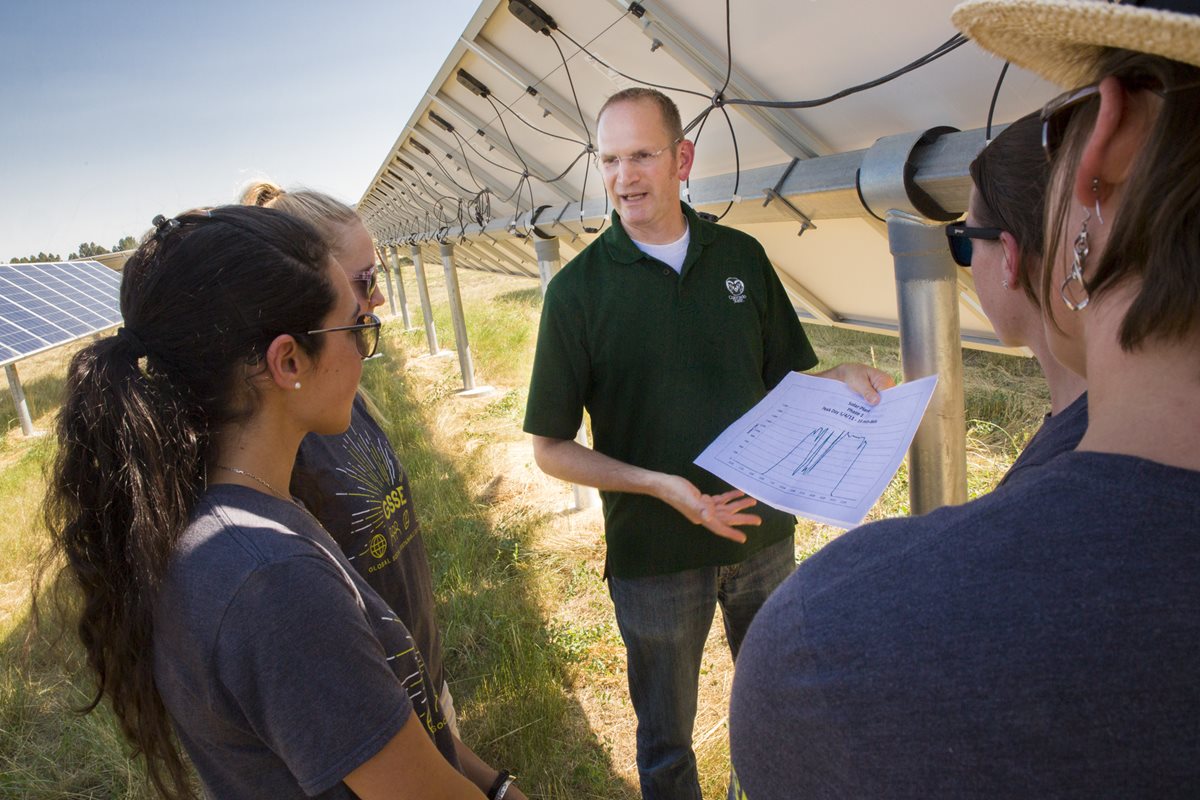Does your firm have an energy or waste issue that goes unaddressed due to lack of expertise or appropriate staffing? Are you looking to position or develop a sustainable product, invest in company resiliency, or explore new opportunities in efficiency?
CSU's College of Business encourages employers to accelerate their progress on sustainability goals by applying for a fellowship student from our top-ranked Impact MBA program.
Extend your team's capacity and make a greater impact!
Host a Student: Apply Now
Program Timeline
- March 1: Applications close
- Early April: Students are matched with host organizations
- May 2: Full work plans due (developed by company & student)
- Late May – Mid August: Students complete 400 hours of required fellowship work
Program details

Stacey Baumgarn, CSU's Campus Energy Coordinator and a graduate of the Global Social & Sustainable Enterprise MBA, which grew into the Impact MBA, talks with business students touring CSU's solar arrays.
Offer a fellowship and increase your organization's impact
Every summer, our Impact MBA fellowship students work to identify, analyze, and address sustainability issues within the public and private sectors. Students are recruited and trained by Impact MBA faculty and staff and then matched with suitable host organizations to complete 400 hours of required work.
Host an Impact MBA student
Impact MBA fellowship students will be prepared to tackle challenges such as pollution prevention, strategic analysis, market assessment, waste reduction, energy use reduction, materials waste, and adoption of firm-wide sustainability measures.
Students can also help businesses align with sustainability standards of government and certifying agencies, as well as supply chain partners.
What do employers need to provide?
Academically rigorous work: Projects must contain analysis, research, recommendations, and some level of implementation. Students are only allowed to work on projects that are technical in nature or capacity building.
Compensation: Participating organizations agree to support a minimum $20 hourly wage, totaling a minimum of $8,000 for students' 400 hours of required work. Some financial support may be available to qualifying entities, such as non-profits.
An assigned supervisor and workspace: Supervisors will develop detailed work plans in conjunction with their fellowship students by May 2 and identify what students should do to prepare for the start of their fellowship.
Sustainability project examples for fellowship students:
 Research: Students could assess ROI and feasibility of an all-electric vehicle fleet
Research: Students could assess ROI and feasibility of an all-electric vehicle fleet
 Risk analysis: ROI and risk analysis of a closed-loop production process
Risk analysis: ROI and risk analysis of a closed-loop production process
 Reporting: Development of an organization's first sustainability report
Reporting: Development of an organization's first sustainability report
 Market Insights: Market analysis and research for a new sustainable product line
Market Insights: Market analysis and research for a new sustainable product line